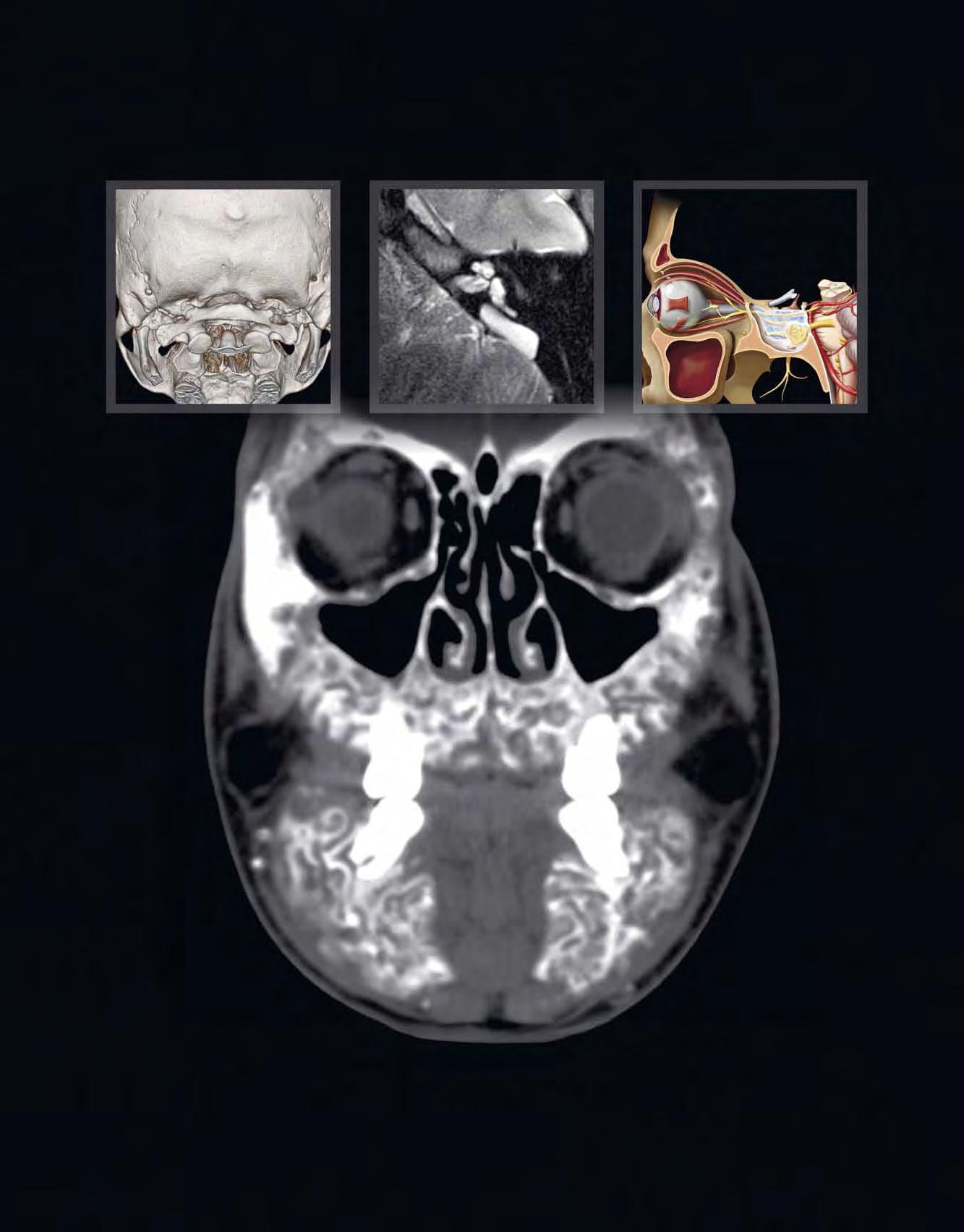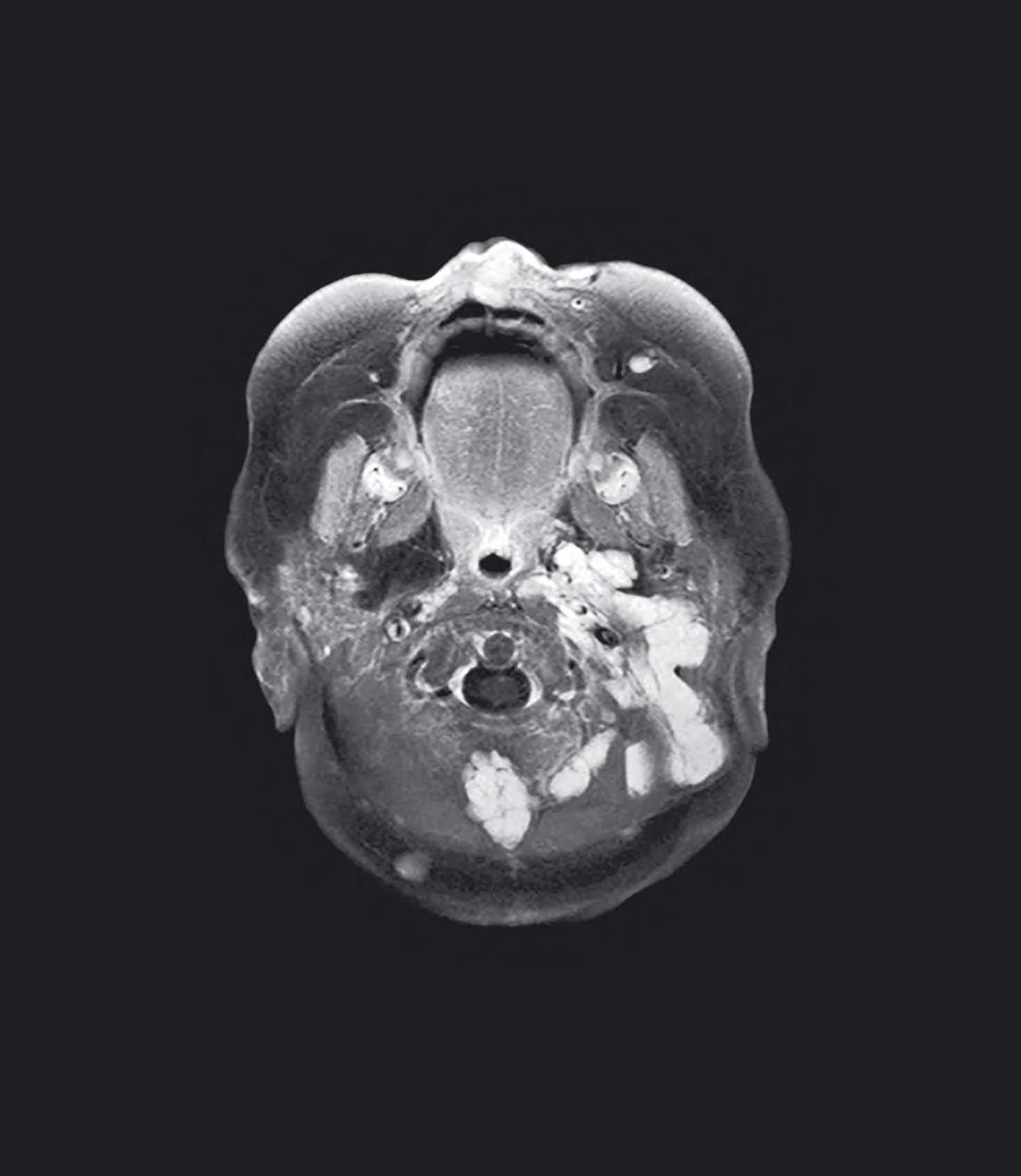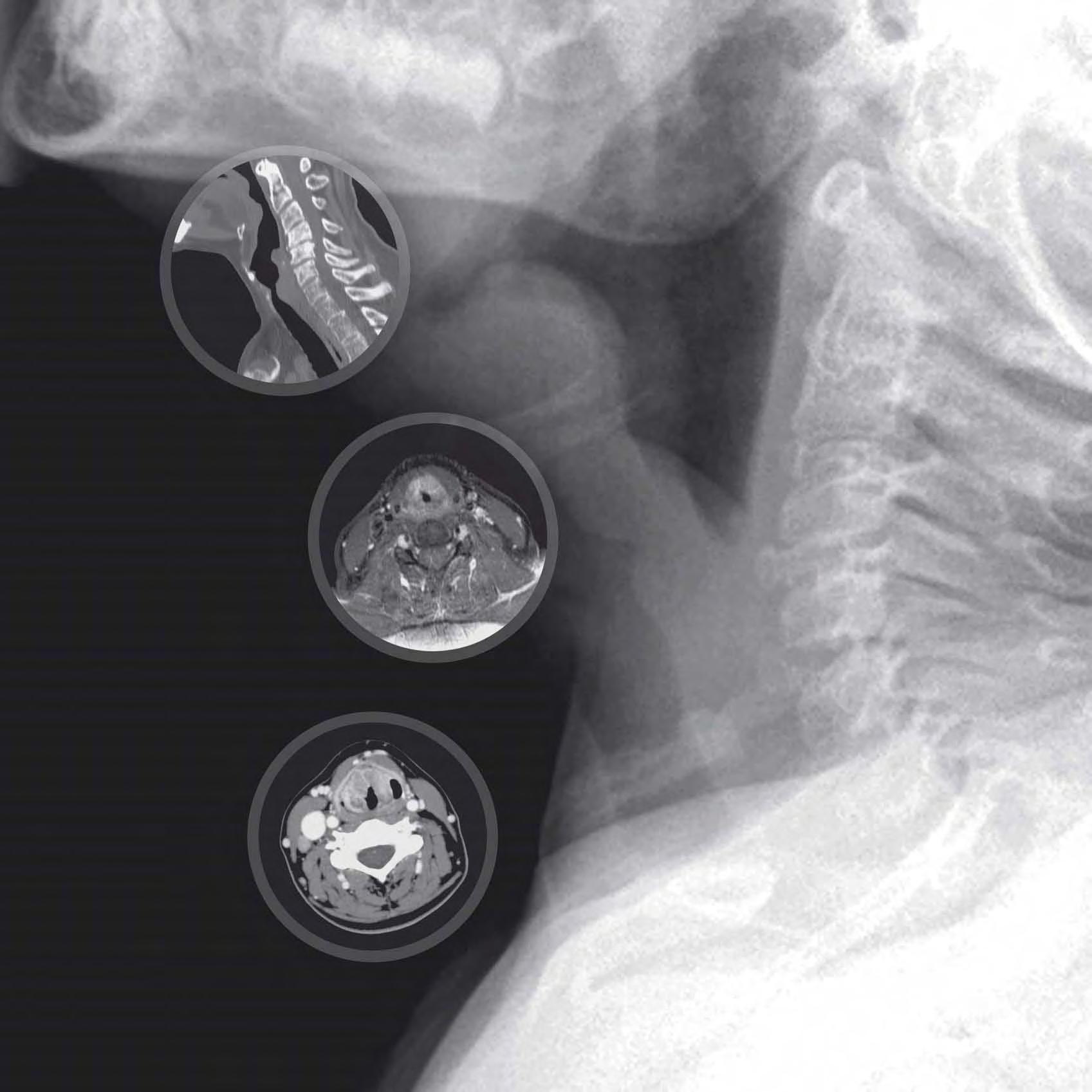TABLE OF CONTENTS
GENERIC IMAGING PATTERNS
96 Diffuse Parotid Disease
Bronwyn E. Hamilton, MD
100 Multiple Parotid Masses
Parapharyngeal Space Lesion
Bronwyn E. Hamilton, MD and Jolanta M. Dennis, MD 10
14
18
Pharyngeal Mucosal Space Lesion, Nasopharynx
Luke N. Ledbetter, MD and Patricia A. Hudgins, MD, FACR
Pharyngeal Mucosal Space Lesion, Oropharynx
Luke N. Ledbetter, MD and Jolanta M. Dennis, MD
Masticator Space Lesion
Bernadette L. Koch, MD and Christine M. Glastonbury, MBBS
24 Buccal Space Lesion
Bernadette L. Koch, MD and Christine M. Glastonbury, MBBS
28 Parotid Space Mass
Bronwyn E. Hamilton, MD and Christine M. Glastonbury, MBBS
34
Carotid Space Lesion
C. Douglas Phillips, MD, FACR
38 Carotid Artery Lesion
42
C. Douglas Phillips, MD, FACR
Perivertebral Space Lesion
C. Douglas Phillips, MD, FACR
46 Brachial Plexus Lesion
Bronwyn E. Hamilton, MD and Christine M. Glastonbury, MBBS
52 Visceral Space Lesion
Bronwyn E. Hamilton, MD and Christine M. Glastonbury, MBBS
58 Cervical Tracheal Lesion
Bernadette L. Koch, MD and Christine M. Glastonbury, MBBS
64 Tracheoesophageal Groove Lesion
Bronwyn E. Hamilton, MD and Christine M. Glastonbury, MBBS
68 Posterior Cervical Space Lesion
Bernadette L. Koch, MD
74 Cervicothoracic Junction Lesion
Bronwyn E. Hamilton, MD and Christine M. Glastonbury, MBBS
80 TMJ Mass Lesions
Daniel E. Meltzer, MD and Joel K. Curé, MD
86 Calcified TMJ Lesions
Daniel E. Meltzer, MD and Joel K. Curé, MD
92 TMJ Cysts
Daniel E. Meltzer, MD and Joel K. Curé, MD
Bronwyn E. Hamilton, MD and Christine M. Glastonbury, MBBS
102 Focal Retropharyngeal Space Mass
Bronwyn E. Hamilton, MD and Christine M. Glastonbury, MBBS
106 Diffuse Retropharyngeal Space Disease
Bronwyn E. Hamilton, MD and Christine M. Glastonbury, MBBS
110 Diffuse Thyroid Enlargement
Bronwyn E. Hamilton, MD
114 Focal Thyroid Mass
Bronwyn E. Hamilton, MD and Christine M. Glastonbury, MBBS
118 Invasive Thyroid Mass
Bronwyn E. Hamilton, MD and Christine M. Glastonbury, MBBS
CLINICALLY BASED DIFFERENTIALS
122 Cheek Mass
Bernadette L. Koch, MD and Christine M. Glastonbury, MBBS
128 Trismus
Bernadette L. Koch, MD and Christine M. Glastonbury, MBBS
SECTION 2: ORAL CAVITY, MANDIBLE AND MAXILLA
ANATOMICALLY BASED DIFFERENTIALS
136 Oral Mucosal Space/Surface Lesion
Luke N. Ledbetter, MD and Patricia A. Hudgins, MD, FACR
140 Sublingual Space Lesion
Bernadette L. Koch, MD and H. Coleman Herrod, MD
144 Submandibular Space Lesion
Bernadette L. Koch, MD and Logan A. McLean, MD
150 Submandibular Gland Lesion
Richard H. Wiggins, III, MD, CIIP, FSIIM
154 Root-of-Tongue Lesion
Bernadette L. Koch, MD and Jolanta M. Dennis, MD
158 Hard Palate Lesion
Richard H. Wiggins, III, MD, CIIP, FSIIM
162 Maxillary Bone Lesion
Richard H. Wiggins, III, MD, CIIP, FSIIM
Another random document with no related content on Scribd:
were close shuttered, and overgrown with ivy, but a little light struggled through the round apertures in the top of the shutters.
Certainly, the room was dusty and smelled close, but for a room unused for two hundred years, it had a remarkably modern appearance. I guessed at once that I had intruded unwittingly into some family secret, and was not slow in coming to a conclusion as to its import. I drew back at once, and closing the door I pushed the cabinet back into its place, determining to tell Mrs. Deborah what I had done. I took an opportunity of doing so when we were together in the still-room next morning. Mrs. Deborah looked surprised but not offended.
"You are a bold girl, Lucy. Were you not afraid?"
"No, Aunt Deborah. I did not believe anything would hurt me, and I had a great desire to see what the place was like."
"And you did not find it at all what you expected. Well, my girl, since you have seen so much, I may as well tell you that those rooms have been used within forty years as a place of concealment for hunted loyalists. Their haunted reputation protects them from any curiosity on the part of the household, and there is a way of access to them from the garden, which I will show you sometime. It is perhaps as well that some one beside myself should be acquainted with the clue, as poor old Roberts cannot live many days. He is the only one who knows anything about the matter, and I may die at any time."
"Does not Sir Julius know?" I asked in surprise.
"No. The family rule has been that the secret should be told to the eldest child—whether son or daughter, unless the
daughter be married. To-night, when the family are in bed, I will shew to you and Amabel the secret passage, but you must promise me, solemnly, never to communicate it, unless to Amabel's eldest child. It may come to be a weighty secret, but since you have unwittingly intruded into it, you must be content to bear your share. There, I am not blaming you. Finding that a door opened into your room, it was but natural that you should wish to see where it led."
That night, accordingly, when the rest of the household had gone to bed, Mrs. Deborah came to our room carrying a light in a lanthorn. Instantly I was reminded of the time when Mother Superior took us children into the vault to show us the danger we had escaped.
"I will never poke my nose into any more secrets!" I said to myself, for truth to tell, I did not relish the expedition at all.
I had been looking at the picture of the ghostly lady in the saloon, and I did not at all fancy meeting that fierce beautiful face at some turn or corner. I had always said to myself that I did not believe in her one bit, but it was one thing to say so in daylight, and another when I was intruding on her den in the night time, by the fitful light of a dark lantern.
However, if the lady were displeased, she did not show it.
Mrs. Deborah led us through the room into which I had peeped, and into another very much like it. Here she pushed aside a corner press which opened bodily like a door, and shewed a dark entry and a flight of steps, very narrow and rugged, which led down below the level of the ground floor, and then up again at a sharp angle, to a low door in the thickness of the outer wall. This she opened and we found ourselves in a small court not far from the stables.
"There is a ghost here too!" said she. "That of a horseman, who walks despairingly up and down, while his horse paws the stones in the corner yonder. Hark, don't you hear him?"
I certainly did hear the sound of a horse's hoof, as it seemed, near by. I suppose it was an echo from the stables.
"Not one of the servants will come hither after night fall, for their lives!" said Mrs. Deborah. "I may just tell you that poor McIntosh of Borlam, lay concealed in these rooms, for many a day, after Foster's treachery lost the day for us at Preston, and it was by this very door that he made his escape, at last, after the pursuit had in some degree cooled down. * But come, we must not linger here. Come to my room."
* The Jacobites firmly believed that the fatal defeat at Preston in 1715, was due to Foster's treachery. There is a curious old ballad concerning McIntosh's escape in "The Borderer's Table Book."
We retraced our steps carefully, noting by Mrs. Deborah's desire, every turn of the path, and found ourselves once more in our own room.
From thence, we proceeded to Mrs. Deborah's, where we found a nice little supper prepared for us, with a jug of hot elder wine to keep us from taking cold, as Mrs. Deborah said.
Certainly, I did not sleep any better for it, nor for the images that haunted my mind of persecuted Jacobites, and possibly more desperate characters, finding refuge in the next room. However, one becomes used to anything. I never found in my life any particular difficulty in keeping secrets, nor did this one trouble me. I should not be telling
it now, if there were any possible use in keeping it, or if these same rooms were still in existence.
Mrs. Deborah was the owner of a small but sufficiently convenient house, with an orchard and garden and a few acres of land, about half a mile from Highbeck church in the opposite direction to the Hall. This house it seems was a kind of heirloom, descending to the eldest unmarried or widowed daughter. It had stood empty for many years, save for the old man and woman who had lived in the kitchen. One day, we rode over to see it with Mrs. Deborah; it was rather forlorn in aspect certainly, but not badly out of repair.
"I shall have it put in order at once!" said Mrs. Deborah, surveying the little parlor. "I have saved money for that very purpose, and the furniture of my own rooms and that which my Sister Chloe left me, will go far toward making the place comfortable."
"Then you are determined to leave the Hall—and me!" said Amabel.
"Child, if I could do you any good by staying, I would never leave you, no, not if that woman humbled me in the dust!" was the reply. "But I should only do you harm. As my brother's wife, she has a right to rule, and I cannot live under her. There would be a constant clash, and I am no match for such as she. Besides, if worst comes to worst, I can make a home for you and Lucy."
There was no use in arguing with Mrs. Deborah, and besides, I felt that her course was a wise and dignified one. For myself, I was determined never to leave Amabel, come what might, unless I were absolutely driven away. I little knew then how I was to be tried, but I soon found out.
It was the middle of July, when letters were received from Sir Julius, or rather from his wife, saying that they would come to Highbeck Hall about the first of August. Lady Leighton wrote that a quantity of new furniture, etc., had already been sent by sea to Newcastle, and that her own housekeeper and other servants, would arrive about a week in advance of her, to attend to the disposition of the things. The old housekeeper was to be pensioned off, by Sir Julius' order. The other servants could remain for the present, if they chose to make themselves useful, and be amenable to the new housekeeper. Then came the sting of the letter, so far as I was concerned.
"As for the young woman, Lucy Corbet, if she chooses to take the place which belongs to her, and for which she was kindly educated by Sir Julius—that of our daughter's waiting-woman—I am content that she should remain for the present. But she must distinctly understand, that it is as a servant and not as an equal, that she is permitted to stay; otherwise, she must make up her mind to find another home. Moreover, if I find her abetting our daughter in her infatuation for that person in Newcastle, with whom she was so unhappily entangled, she will be dismissed at once; that affair Is entirely at an end, and Miss Leighton must hold herself like a dutiful child, at her parents' disposal."
"There shows the cloven foot!" said Mrs. Deborah.
"I am glad of it!" I answered. "I like to know what I have to expect."
"You need have to expect nothing of the sort, Niece Corbet!" said Mrs. Deborah. "You are quite welcome to a home with me so long as I have one, or till you can communicate with your kinsman in the South."
"Oh Lucy, you must not leave me—you will not leave me!" said Amabel imploringly, her eyes filling with tears. "Remember what you promised me before we came from France. I am selfish to wish to keep you here to be insulted, when you might have a happy home with Aunt Deborah, but how can I face life without you?"
"You shall not face it without me!" I answered. "My mind is made up about that. Dearly as I should love to live with Aunt Deborah, I can never leave you while it is possible for me to stay. When it is not, if dear aunt will take me in, I will gladly come to her."
"And will you—a Corbet of one of the best families of the South—will you take the place of a waiting-maid under this proud woman?" said Mrs. Deborah, her brows darkening.
"For Amabel's sake I will take any place, and endure any affront, Aunt Deborah!" I answered. "Where she goes I will go. The Lord do so to me, and more also, if aught but death or dire necessity part her and me."
I said these solemn words advisedly. I had said them in my own mind many times while thinking of this very thing. Mrs. Deborah's brows relaxed.
"You are your father's own child, Lucy. Have your way then, since I verily believe it to be the right one. When you can no longer stay here, then come to me both of you. If I am not living, go to your aunt at Thornyhaugh. Bless you, children, you do surely show forth your faith, not only in your lips but in your lives."
CHAPTER XXI.
CHANGES AT HIGHBECK.
MRS. Deborah at once began her preparations for removal to the Little House, as her mansion was called, and we helped her as far as we could.
Amabel kept up wonderfully considering, and tried her best not to let her trouble, trouble others. But it is not the people that bear things best, who feel them least, and as I saw my dear girl's face grow pale and thin, and noted the dark marks under her eyes, my heart was very bitter toward the author of all this distress.
In some sense, her pain was harder to bear than mine, inasmuch as I could say, "I opened not my mouth, because Thou didst it." No hand but my Heavenly Father's had parted Mr. Thorpe and me—for it seemed quite certain by news received from the East, that his ship had gone down with all hands, during a great storm in the Indian Ocean.
In another, mine was the worst. For Amabel there was still a charm, Sir Julius might change his mind or a dozen other things might happen. Mr. Cheriton was at Newcastle alive and well, and we heard of him every now and then by Mrs.
Thorpe, who wrote every time she sent a parcel to me or to Mrs. Deborah. (It was a wonder how many things Mrs. Deborah needed from Mrs. Thorpe about that time.)
But my friend was gone. I could never see him again as long as I lived. My heart might hunger as it would to see or hear from him, and I never could see or hear from him—no, not if I should run all over the world. Let no one say that absence is like death. It is like that other popular folly of comparing death and sleep. There is the distance of an eternity between them.
As for my other trouble—that of being degraded from being Amabel's equal and companion, to being her waiting-woman —that did not disturb me very greatly at this time. I had faith enough in Amabel to believe that it would make no difference with her, and I had too great a contempt for Lady Leighton to trouble myself very much about her. I had yet to learn that people whom we despise can sting almost as deeply as those whom we respect.
The arrival of the new furniture and servants at the Hall was the signal for Aunt Deborah to leave it. The new housekeeper turned out to be Mrs. Wilson, my lady's woman, whose acquaintance we had made during that unlucky visit. She was full of her own consequence, found fault with everything, scolded the old servants, was barely civil to Amabel and a good deal less than civil to me.
The old housekeeper Jenny and Richard left the hall with Mrs. Deborah and also old Elsie, who was still alive and able, as she expressed it, to do a days' darg with any one.
I should mention perhaps, that Elsie's great nephew Alick Grahame who had attended his lady on her late visit to Highbeck was greatly smitten with our little Mary Lee, and
some love passages had been between them. Elsie had at first been rather scandalized at her nephew for falling in love with a town-bred English girl, but Mary's pretty neat ways and kind attentions to herself had won her over, and she was well-pleased with the affair. So were we, for Alick was a fine young fellow, a favorite with his mistress and likely to do well in the world.
In due time came an avant-courier with news that my lady was on her way from Newcastle and might be expected by supper time. Every thing was now in a bustle to receive her, Mrs. Wilson was here, there, and every where, overseeing, scolding and arranging. Amabel and I were in our room, when she put her head in at the door without the ceremony of knocking and said in a sufficiently pert tone—
"Mrs. Leighton, I think on such a day as this, you might spare your woman to help me a little instead of keeping her here busy with that nonsensical embroidery!"
Amabel turned full upon her, her gray eyes lighting up—
"Did you knock, Wilson?" she asked carelessly. "I did not hear you!"
"I beg pardon!" said Wilson in a tone which sounded as if the words were dragged out of her—
"Very well!" said Amabel. "That will do. Be so good as to shut the door."
Wilson was absolutely cowed and went away without another word. I ventured to hint to Amabel that she had probably made an enemy of this woman.
"I do not think so!" was Amabel's reply. "If I read her aright, she is one of those natures who take all kindness for
timidity and behave themselves accordingly. At all events, it will be time to give way when I am obliged to."
Lady Leighton arrived in good season with a train of servants and attendants of all sorts, and was received with a great deal of form. I did not see the meeting, but Amabel told me afterward that Lady Leighton had been very affectionate to her, saying that she had no doubt Amabel would show herself a dutiful and obedient child to the mother Sir Julius had given her.
"Mother indeed!" said I. "It is a profanation to apply the word to her.”
"Hush dear!" returned Amabel. "Remember she is my father's wife and we must treat her with the respect due to her position."
"And you, Amabel!"
"I curtsied and said I hoped I should always remember my duty. I could not say more."
"What did your father say?"
"Sir Julius has not come!" was the reply. "It seems business has detained him in London for the present. Lady Leighton tells me that she is expecting a house full of company next week."
There is a certain class of beings who are said to appear when spoken of. I would not say that Lady Leighton belonged to this class, however well qualified she might be to adorn it, but it is certain that she came in at the moment we were speaking of her.
"What is that about Lady Leighton!" said she.
"I was but saying Madam, that you told me you were expecting company!" replied Amabel.
"Yes, that is true, and I trust we shall give you a little gayer life than you have been leading lately. Is this your waitingwoman, my love?"
"This is Lucy Corbet, my foster-sister, Madam!" replied Amabel. "I thought you had known her as you entertained her at your house in Newcastle."
"Oh!" said Lady Leighton, looking slightly disconcerted, but recovering herself in a moment. "Yes! I was misled by the intimacy which existed between you, into treating her as an equal with yourself—but it must be understood," she added, her eyes growing bright and fierce as I had seen them before—"it must be understood at once, that all that must be at an end. I do not blame you so much as your guardians in France and your father, who allowed such a state of things to grow up, but the young woman must understand that if she remains, it must be as a servant and under my control or that of my housekeeper. Do you hear me, young woman?" Turning to me.
I simply curtsied.
"Very well! I see you can be humble when it suits you. Keep so, and you may find me your friend. Let me see you put on any fine lady airs and you leave this house on the instant!"
I curtsied again. My Cornish blood was boiling but I was determined not to give her any handle against me. Lady Leighton now turned to Amabel, criticised the fashion of her dress and found fault with the arrangement of her hair.
"One would think you had lived in the ark all your life!" said she. "Pray for whom are you wearing all this mourning?"
"For my Aunt Chloe, who died not three months since, madam!" answered Amabel.
"Nonsense, child! Nobody mourns for aunts and uncles nowadays. That kind of thing is gone out. I must see you in colors directly. What a preposterous head. I think, after all, I must put one of my own women about you. I cannot have you looking so like a fright. Corbet, cannot you at least lace up your mistress properly?"
"It was Mary Lee who dressed me, madam," said Amabel.
"I must find something else for her to do," was the reply. "A chit like you does not need two women, surely. This is a pretty room—much prettier than mine. I think I must change with you. What is next you?"
"The haunted rooms, madam," I answered, with some satisfaction. "There is said to be a ghost in them, and it is there the howl of the wolf is heard when any great misfortune is about to befall the family."
"Nonsense!" said Lady Leighton, turning pale through all her rouge. "What stuff is that?"
At that very moment, before the words were fairly out of her mouth, a long-drawn and most doleful howl, ending with a frightful sound between a scream and a yell, was heard, as it seemed, close by.
Lady Leighton turned still paler, and grasped a chair as if to keep herself from falling. "In Heaven's name, what was that?" said she.
"It sounded like a howl," said Amabel, which it certainly did.
As for me I was ready to choke, but I bestirred myself to hand Lady Leighton a smelling-bottle and to fan her, for she looked ready to faint away. She revived presently, and evidently made a great effort to recover her self-possession. I thought she was even a little mollified toward me, for she told me at parting that she had no ill will toward me so long as I behaved myself properly.
"What could it have been?" said Amabel, turning to me after her ladyship had left the room.
"You goose—begging pardon for calling my mistress a goose," said I. "Don't you know the voice of Sultan, the young bloodhound? I can make him warble like that any time with my little ivory whistle."
"Why did not you speak, then?" asked Amabel, rather pettishly, for she had been a little scared as well as my lady.
"It was not my place," I answered, with a demure curtsy. "I must practise upon keeping my place, you know. But, Amabel—mistress, I mean—"
Amabel flew at me and shook me.
"Let me ever hear you say that again!" said she, kissing me between the shakes. "How dare you? But what were you going to say?"
"How can I tell, you have shaken it all out of me," I returned, laughing. "Oh, I know. Amabel, don't you know when we first looked at the picture of the wolf-lady, we wondered who it was like?"
"Yes; why?"
"It is like Lady Leighton. Don't you see she has the same blue-green eyes and thin lips, and the same look of watchfulness? Perhaps, after all, that was her relation calling for her."
"Don't say such horrid things," answered Amabel, shuddering. "I can see the likeness you speak of, however. But, Lucy, you will never be able to stay here. It is not right that you, a young lady of fortune and family, should be exposed to such indignities. You must go to Aunt Deborah. It would bit too selfish in me to keep you."
"Don't you see that is exactly what she wants?" I asked. "It does not suit her policy just now to dismiss me altogether. It would make a talk, and perhaps give rise to awkward enquiries. If she can make me go of my own motion, she will, but I don't think she will accomplish that. I will leave when I am forced—not before. Don't you remember Mrs. Thorpe's saying once that when it came to a contest between will and won't, won't had the advantage, because won't had only to stand still?"
"How happy we were in those days, and how far, far away they seem!" observed Amabel, sighing. "Mother Superior might well say that the world was a hard place."
"It was in those happy days that we learned what must support us now, Amabel," said I. "Where should we be, but for the books Mr. Wesley gave us, and the truths he taught us?"
"Oh, if we could only see him and ask his advice!" said Amabel, and with that she fell to crying hysterically, so that I had much ado to get her quieted again.
Poor thing! She was over-wrought, and nature would have her way. She was really ill next day with a headache and
sore throat, and the illness was not without its advantages, for Lady Leighton never came near us, and we were left in peace for at least a few days.
I will not pretend to give an account of the slights and indignities I was made to undergo whenever I left the shelter of Amabel's room. The new servants were not slow to perceive that I was no favorite with their mistress, and treated me accordingly. I no longer dined with Amabel, but in the housekeeper's room, and Mrs. Wilson took care that I did not lack sauce to my meat. She was herself in a very bad humor. She was horribly jealous of her lady's new French waiting-woman, and provoked at the amount of care and work which fell to her share.
A mischievous man-servant, one of the old stock who had staid behind, made sure that she should hear of all the ghost and goblin tales about the place, and did not fail to add mysterious hints of hordes of gypsies and border robbers which haunted the wild recesses of the hills. The brown man of the moors and the old Picts (still feared and abhorred in Northumberland,) were not wanting, till poor Wilson was actually afraid to go to bed.
An odd accident one day turned this woman from an enemy into my friend. There was a young Highland bull of a very fine breed (a present from Thornyhaugh to Mrs. Deborah, who loved cattle,) which was pastured in a field near the house. This bull had been a pet of mine, and I often fed him with bread and salt, so that he would come readily at my whistle, and as he had never shown any ill-temper, I was not at all afraid of him.
One day I had set out to see some of the poor women in the almshouses, and had not gone far when I saw Mrs. Wilson in a position of some danger.
Some one had left open the gate of Chieftain's enclosure, and he had come out to taste the grass by the lane side. He was feeding peaceably enough, when Mrs. Wilson came by with a red silk apron on, and Chieftain instantly conceiving in his bovine mind that the same red apron was intended as an insult to himself, at once began to stamp, tear up the ground and lash himself into a rage.
Wilson had just sense enough not to turn and run, but not enough to take off the obnoxious apron. She was backing toward a stone wall, and Chieftain was following her, more and more enraged every moment.
I saw directly that she would never be able to mount the wall, and that help must be had at once or not at all, and I resolved with an inward prayer, to try my power over the creature. I blew a sharp note on my whistle. The bull looked round, and gave a grumble of recognition, as who should say, "wait till I finish this little affair and I will come," but, as I called him, and held out the basket from which he was used to receive his treats, he turned and followed me quietly enough. I led him to his enclosure, tempted him inside, and gave him half a loaf of white bread, which I was carrying to poor Mary. Then securing the gate, as well as I could, I went back to find out what had become of Wilson. I found her sitting flat on the ground, crying as if her heart would break. Her first words were very unexpected—
"Oh, Mrs. Corbet, I have used you shameful, and yet you have saved my life. I do believe that nasty creature would have killed me before I could get away. But I beg your pardon for treating you so—that indeed, I do; and I will never do it again, if you will only forgive me!"
"I forgive you with all my heart!" said I. "But don't sit there on the wet grass, or you will get a fever, and that will be as
bad as the bull."
I helped her to rise, and finding that she really trembled so she could hardly stand, I gave her my salts and my arm to lean on back to the hall. She found her voice presently and began to pour out her woes. She hated the place. It was not what she had expected. She was worked almost to death, and my lady was taken up with that grinning French woman, and had never a good word for poor Wilson, as had served her so long.
I tried to stop her, but I might as well have tried to stop the Highbeck at flood time. At last the worst of her troubles came out. She was so afraid. She heard such dreadful noises at night, like people walking and whispering in the entry and in the room itself, and cries and groans that seemed to come from far down, and I don't know what all. She slept with a Bible under her pillow, but it did no good. The noises came all the same.
"Did I think a Prayer-Book would be better?" Her terror was so real, that I could not but be sorry for her.
"Neither Bible nor Prayer-Book will do you any good by lying under your pillow!" said I. "They are not made to be used like adder stones or rowan twigs. Study your Bible and Prayer-Book, confess your sins, ask Divine protection, and then you will not be afraid of the noises the wind makes in this old pile."
"But, I can't!" sobbed Wilson. "I am not good like you and Miss Leighton, and I have done so many wicked things. Oh, I wish I had never left my mother's cottage to wait on a great lady."
The poor thing was really hysterical, so I got her to bed and sent her some lavender and sal volatile by Mary Lee. She
was well enough next day, and I fear her penitence had vanished with her fears. However, she was henceforth kind and respectful to me, and did a good deal to make my life more endurable, by checking the insolence of her fellow servants.
Lady Leighton's guests arrived in a day or two, and I recognized among them several persons whom I had seen in Mrs. Thorpe's shop. Lord Bulmer did not present himself, but I heard from Mrs. Wilson, who told me more news than I cared to hear, that he was expected—
"And worse luck, I say!" added Wilson. "I wish he was a thousand miles away! Miss Corbet—" she added, whispering in my ear, "do you tell Miss Leighton to beware of him, and keep out of his way yourself. He is a bad wicked man. He has my poor lady under his thumb, and will make her see sorrow—"
"Hush!" said I, interrupting her. "You must not betray your lady's secrets."
The woman stared at me half amazed.
"I thought you would like to know!" said she. "I thought my lady was your enemy."
"She is not my friend, I fear!" I answered. "Nevertheless, I must do by her as I would be done by. We have no right to return evil for evil, even to our enemies, you know. If you knew any secrets of mine, supposing I ever had any, I should not like to have you tell them to my lady."
"I believe you really are good!" said Wilson. "My lady says you are a canting Methodist. Are you? Did you learn that among the Methodists?"
"I learned it from the word of God!" said I. "Where you may learn many things that will do you good, in this world and the next. As to being a Methodist, I do not know what that means. There, I think your distilling is going on all right now,—" for I had been helping her in the still-room, where she got into unheard of difficulties, and had nearly blown herself up two or three times. "Do not let your still get too hot, and you will do very well."
"I am sure you are very kind to take so much pains for me!" said Mrs. Wilson. "But Miss Corbet, it is on my conscience to tell you one thing which I know, for certain—no matter how," she added, putting her face close to mine. "Lord Bulmer is determined to marry Miss Leighton, and he will make my lady give her to him. As to Sir Julius, he is just a mould of weak calves-foot jelly, he will keep any shape you put him into, so long as he is in it and no longer!"
I retreated to my own room very much moved by what I had heard, and sat down to consider it. I was alone, for Lady Leighton had kept Amabel much with herself for the last few days, and seemed to be trying to conciliate her. I thought over what Wilson had told me, about her lady's being in the power of Lord Bulmer, and I remembered, or, thought I did, that on the evening we had spent with her, she had treated him quite differently from the other young men who formed her court. What hold could such a coxcomb have over this imperious woman of fashion, accustomed to carry all before her? Did she owe him money, or was he in possession of inconvenient knowledge?
"Oh my soul, come not thou into their secret!" I said to myself.
But supposing that Sir Julius and his lady were both against her, would Amabel hold out? Of that I had little fear. But
would she not, might she not, be forced into a marriage? Such things were done I knew well enough. I had heard of more instances than one. All things considered, I thought it but right to tell Amabel of what I had heard, and the warning Wilson had given me. I had no chance during the day, but at last she came to our room looking pale and tired enough. Lady Leighton had said no more about changing rooms with us, and indeed she seldom or never came into our part of the house. Like many other perfectly irreligious people, she was very superstitious, would turn pale at the screech of an owl, and be miserable a whole day, because she had dreamed of a white horse, and I owed the only invitation I had received since her arrival, to the fact that there were thirteen people to sit down.
"Oh Lucy, how tired, how tired I am!" said Amabel, dropping wearily into a chair. "What should I do, if I had not you to come back to?"
"You would have a better Friend than poor Lucy!" I returned. "Come, let me loosen your gown and stays, and make you comfortable. What have you been doing to tire you so?"
"It is not what I have done!" said Amabel. "I have walked out with my lady a little, but that did not tire me. It is these people and their talk that disgusts me. That rational beings can occupy themselves in such ways, and that women who call themselves ladies should listen to, and join in such talk. Nobody is safe from their tongues—not those they call their dearest friends. I wonder whether it ever occurs to my lady, that these same people talk of her in just the same way, behind her back."
"No doubt they do!" I remarked. "You know Mrs. Thorpe used to say, that a dog which would fetch a bone would
carry a bone. It was a homely proverb, but I believe it is true."
"Then the everlasting trifling!" resumed Amabel. "The utter impatience of any thing like seriousness, and worse, the making free with sacred names and things. Mr. Dugdale must needs address himself to me, with some ridiculous riddle about St. Peter."
"And what did you say?" I asked.
"I told him he must excuse me, for I did not consider the sacred word as a theme for merrymaking and jesting. He had the grace to look a little abashed."
"And what said my lady?"
"Oh, she said—'You must know, Dugdale, that my daughter sets herself up for a precisian and a saint; but we shall soon cure her of that folly when we get her to town.' And then, Lucy, she had the cruelty and effrontery—yes, I will say it, if she is my father's wife—to ask him if he had heard the upshot of the affair between Mr. Cheriton and the pretty milliner's daughter. Was he really going to marry her? Or was he only amusing himself? And Mr. Dugdale answered with an oath, that Walter Cheriton must be greatly changed since he knew him, if he mixed up in any such affair as that."
"I am glad the young man had that grace at least!" said I. "But Amabel, you will not let such idle talk disturb you, will you?"
"I will not let it shake my faith in Walter, for the tenth part of a moment, if that is what you mean!" said Amabel, raising her proud head as in defiance. "And then that Mr. Trimble, the new chaplain, must needs say, that every one
knew how Cheriton was using his power over the poor people, and that old Wesley was just the same. And I had to sit by, and hear it all."
"Poor child!" said I devoutly, hoping this might be the worst that Amabel would have to bear. "But now listen to me, darling, I have something to tell you;" and I imparted to her Mrs. Wilson's news about Lord Bulmer.
"I have feared as much from some hints that my lady has let fall!" said Amabel. "But I will never consent. I have told my father that I will not marry Walter against his will, at least till I am of age; but I will never wed any one else—no, not if they drag me before the priest. I have made up my mind to that. I will flee to my aunt in Scotland, or perish on the hills before I will marry any one but Walter Cheriton."
"It may not be so easy to flee!" I suggested. Amabel smiled.
"I know this old house, better than my lady does!" said she. "I have explored it too well, not to know that there is hardly a room which has not more entrances than one. Have you forgotten the ghost's room, and the secret stair, Lucy?"
"But suppose my lady changes the rooms?"
"I believe there is no danger of that at present. But Lucy, let us not borrow trouble, we know who has promised to care for us, and He will surely perform His word, though not perhaps in our way. Let us go to our reading and settle our minds in that way. There is no other."
The next day was Sunday, and in the evening occurred the first distinct collision between my lady and Amabel. We had all gone to church in the morning, filling the great family
pew where Amabel and I had been used to sit with Mrs. Deborah. I was about to enter it as usual, when my lady in a voice which could be heard all over the church, haughtily ordered me to take my place with the servants where I belonged.
I knew that the little gallery was already crowded rather more than was safe, and was about to sit down on one of the free seats, when Mrs. Deborah opened the door of the rectory pew where she was sitting, for me. Whether my lady saw it or not, I do not know, at any rate she thought it best to make no disturbance. I saw a good many flashing eyes among the poorer folk, for Northumbrians are very independent in their feelings, and by no means endued with that slavish reverence for "the quality," which is found in the East and South; and I was decidedly a favorite among the villagers.
I was glad to see that Mr. Lethbridge was not in the least disturbed by the presence of so many distinguished strangers. He read the service in his usual solemn way, for though he was not what could be called a good reader, he was impressive by his evident sincerity.
His text was "Be sure your sin will find you out!"
And he spared nothing in enforcing it, though my lady yawned, whispered, and all but laughed aloud, as did several others of her company. I was glad to see that Mr. Dugdale and his sister took no part in these performances, but withdrew themselves into a corner and listened with respect at least.
My lady treated Mrs. Deborah to a swimming curtsy after service, which Mrs. Deborah returned with a dignified salute, and that was all which passed between them in
church. As soon as she reached the porch, my lady called me sharply to her—
"Corbet, why did not you take your proper place as I told you?"
"The gallery was already crowded, my lady!" I answered. "And it is not considered altogether safe. It has not been used for some years."
At this moment Mrs. Deborah's clear voice broke in—
"I shall take it as a favor, madam, if you will allow my niece Corbet to sit with me in church as she has always been used to do. She is of course entitled to the pew which belongs to her father's estate—that next your own, but as it is not agreeable for a young gentlewoman to sit alone, I shall be obliged, if you will give me her company."
Lady Leighton turned her eyes on Mrs. Deborah and tried to stare her down, but it would not do—Mrs. Deborah was more than her match. Every one had heard her words and the visitors were exchanging glances of amusement. She tried to give the matter another turn.
"Certainly, Mrs. Deborah. It shall be as you please—I was not aware that the young person was an acknowledged relative of the family, though I had heard there was some connection. Shall we not see you at the hall, Mrs. Deborah?"
"I shall do myself the honor of calling when my brother returns!" was the answer, with another stately salute—and the two ladies separated.
I dined in the housekeeper's room, and found myself treated with more than her usual respect by Mrs. Wilson. She even rebuked one of the men sharply, for presuming to
make fun of the sermon. The man stared, and asked Mrs. Wilson if she were turning Methodist.
"Methodist or not, I will be mistress at my own table!" answered the housekeeper. "And I will have you to know that, John Davis."
The man answered sulkily that he meant no harm. It was no more than his betters did.
"Aye, you must all ape your betters, though they were riding posthaste to perdition!" said Mrs. Wilson.
And there the matter ended.
That evening, I was alone in our bed room. My lady had taken the little red parlor for her own use, so I had no other place. I was sitting by the open window trying to compose my spirits reading Mr. Law's "Serious Call," which was, and is, a great favorite of mine, till it grew too dark to read, when I began singing softly to myself my favorite song from the Messiah. I had not finished it when Amabel entered the room.
"All in the dark!" said she.
"I did not expect you so early," was my answer, "and the twilight is so sweet, I do not like to shut it out. But how did you contrive to escape so soon?"
"I was sent away in disgrace," was her reply. "My lady all but boxed my ears!"
"Why, what was the matter?"
"The matter was this. I had sat quietly in my corner, taking no part in what was going on, but talking with Miss Dugdale about our old convent life in France. She seems a nice modest young lady, and I wonder her mother should trust her here by herself. However, we were talking quietly, as I said, when my lady came up and asked me if I knew how to play piquet. You know we learned it of Mr. Thicknesse, so I could not say no
"'Come then!' said my lady. 'Here is Mr. Merton wishes to play. Sit down and play with him, and I will look on and learn.'
"She spoke quite kindly, and as I know a great many people do play cards on Sunday, I expected no scene, but simply asked her to excuse me.
"'But why? Why should you not afford Mr. Morton that pleasure?' she asked.
"I told her that I could not play cards on the Lord's day—it was against my conscience.
"With that she laughed scornfully you know her way and said that since my conscience allowed me to join such an assembly at all, it need not be so particular as to what I did there.
"And she was so far right, Lucy. I had no business there, and nothing shall take me there on a Sunday night again.
"I told her that if she would permit me I would leave the room, and Mr. Merton said very politely, 'Pray don't force Miss Leighton's conscience, madam, another time, perhaps, she will oblige me.'
"But my lady would not give up the point, and she must needs call in the chaplain, who talked about the danger of being righteous over-much, and said only Methodists and fanatics indulged in such fancies. Then my lady assumed the imperious, and ordered me to
sit down instantly, and I told her she must excuse me, whereat, she ordered me out of the room, and here I am."
"I hope you may hear no more of it!" said I. "If I read my lady aright, she will never forgive anyone who refuses to yield to her."
"I cannot help it, Lucy. Where my conscience is not concerned—where there is no question of right and wrong—I will give way to her in all things, es I have done already, in leaving off my mourning. But when I see things to be wrong or even doubtful, I must forbear them whatever it costs."
I was right in thinking that Amabel had not heard the last of the matter. That very night my lady came to our room, and after berating Amabel in no measured terms—for fine ladies of that day used to scold and call names like fish-wives, actually forgot herself so far as to box her ears. If there had been a weapon in my hand at that moment, I do believe I should have killed her. I sprang forward, but Amabel put her hand on my arm to check me, while she stood looking Lady Leighton straight in the face, white as marble and as firm.
"Well, then, I did not mean to cuff you, though you richly deserve it," said my lady, feeling, I suppose, that she had put herself in an awkward position. "I am quite ready to overlook your silly and impertinent conduct this evening, so you promise to obey me in future."
"I have already said, madam, that I will obey you in all matters not of conscience," replied Amabel.
"Which means that you will only take your own way when you want it," was the reply. "We shall see who is to be mistress in this house. As for you, Corbet," turning to me, "you will do your young lady no service by abetting her rebellion, I can tell you that, nor yourself either. I chose to pass over your conduct this morning, because I did not wish to make a scene in a public place, and with a childish old woman, but I can tell you I shall allow no rebellion, however it may be abetted. It would take very little to make me send you a packing, and this insolent girl to a boarding-school, where she will learn to do what she is bid without appealing to her conscience."
I simply curtsied. I have always found silence the best armor in dealing violent people.
"As to you, Miss Leighton, your father is coming in a short time, and we shall then see who is to be Lady Paramount. I repeat once more that I will send your favorite woman adrift and yourself where you will learn obedience by the hardest if I see any more of these airs from either of you."
With this she quitted the room.
"Well, we have learned something!" said Amabel. "We know that my father is coming."
"Much good he will do," was on my lips, but I did not say it.
I bathed Amabel's heated cheek with elder flower water, for my lady had struck in good earnest, and I was afraid her fingers would leave a black mark. I think she herself was scared at what she had done, for she was all sunshine and sweetness the next day—even to me. She happened to hear me singing over my work, and was so much pleased with my voice as to ask, or rather command me, to come and sing for the entertainment of her company that evening. I was not sorry to oblige her, and received many compliments on my performance.
After this for a time we had fair weather at the Hall. I was frequently called on to sing alone, or in company with Amabel and young Mr. Dugdale, a simple young gentleman, knowing a great deal about music and china, and a very little about any thing else.
My lady was all honey to me, and even made me a present of some lace—small thanks to her. She intimated to me very clearly that she could make or mar my fortunes accordingly as I served her. I wanted none of her making, and, indeed, my greatest fear was that she should find out a match for me.
However, I was willing, for Amabel's sake, to be on good terms with her
The next Sunday no one went to church but Amabel and myself, and Mr. Dugdale and his sister. We had a quiet, pleasant walk home, conversing on serious subjects, and Mr. Dugdale showed a little better side to his character than I had yet seen.
As we reached the Hall door, he asked Amabel if he should see her in the saloon that evening.
"No, sir!" answered Amabel. "My lady has kindly promised to excuse me."
"Then, perhaps—perhaps—" said the young gentleman, stammering between bashfulness and earnestness. "Perhaps you will allow my Sister Chatty to spend the evening with you."
"Please do, Miss Leighton," added Chatty.
"You see, though I have a great regard for my lady, and—and—all that," pursued Mr. Dugdale, "yet Chatty is young, and she has no mother to direct her, poor thing, and I am a man of the world, you know, but Chatty isn't, and—really, you know, I do think, young ladies—you understand—"
If we did understand, it was no thanks to him, poor young man, but of course, one could not refuse such a request.
Chatty spent the evening with us, and we had a very quiet, profitable time reading the Bible, singing, and talking. Chatty was a nice, modest, sensible young girl, who had a bias to good given her in her childhood by her mother. She was glad to talk of that mother, and to have her lessons recalled. She has since married well, and makes an excellent and happy wife and mother, with a great family of daughters, one of whom is my namesake.
The next day we saw the arrival of a groom on horseback with letters to my lady, and learned that Sir Julius was expected to arrive before evening.
CHAPTER XXII.
SIR JULIUS arrived sure enough, and with him Lord Bulmer, and another gentleman whom I did not know, but who was presented to Amabel as Captain Dangerfield. The moment I saw this man, I conceived an intense aversion to him, as if I had had a premonition of what he had come for. He was rather handsome—indeed, I think most people would have called him very handsome—but his style of face was one which I always distrust. He had rather a high, round head, with wavy hair growing well back from his forehead, eyes at once black and shallow, and opening very widely lip and down, and eye-brows highly arched. I could judge nothing of the shape of his mouth, for he wore a heavy moustache, having been, it was understood, in the imperial service.
Sir Julius was very gracious to Amabel, and hardly less so to myself. He seemed surprised at the Position in which he found me, and meeting me after supper asked me why I had not been to the table. I told him the simple truth—namely, that my lady had ordered me to take my meals in the housekeeper's room, whereat, he muttered something, and seemed greatly disconcerted. I fancy, he and his wife had some words about the matter, and that she judged it best to give way; for the next day my lady sent for me, and ordered rather than invited me to take my meals with the family as usual.
It was evident from the very first, that Lord Bulmer had come as Amabel's suitor. He lost no opportunity of appearing in that character, and fretted her constantly by his assiduous attentions. She on her part was barely and distantly civil, gave him the coldest and shortest answers, refused his attentions whenever it was possible, and took no more notice of his compliments than the picture of her grandmother in the saloon would have done. She kept me close by her side on all occasions, and in short gave his lordship clearly to understand that he was utterly disagreeable to her.
I am not sure that this was good policy on Amabel's part. Lord Bulmer was so accustomed to conquer wherever he went, so used to being courted instead of courting (for he was esteemed the greatest match in the country), that this decided opposition on Amabel's part put him on his mettle, and made him determined to conquer her aversion and win her regard. I do think he loved her, so far as his base and sensual nature was capable of loving anything.
As for my lady, I did not know how to understand her. She seemed at once to be jealous of Lord Bulmer's attentions to her step-daughter, and desirous of forwarding his suit. At the very time she contrived to have the two tête-à-tête, by calling me to her side, I have seen her look at them, as though she would like to kill both of them.
Meantime she filled the house with guests—mostly gentlemen—till there was not a spare corner, except the ghost rooms and the apartments known as the King's chamber. I think that she would have laid violent hands on these, only that when she spoke of having them put in order, the servants, with Wilson at their head, declared they would leave the house at once, if the door was so much as opened. I knew there was no particular danger of such a catastrophe, from the simple fact that Mrs. Deborah had carried off with her the keys to that part of the house. There was no way of entering the ghostly rooms, for even the door which opened from our room had been fastened on the other side. So the guests were accommodated wherever a place could be found for them, and the shut up rooms remained shut up still.
There were a great many people coming and going, and, as I could not but observe, arriving very frequently in the night. There was much whispering in corners, and reading
and writing of letters, and white flowers and ribbons were paraded upon all occasions. Only Amabel would wear none but red flowers and ribbons, though they were not especially becoming to her, and when one day my lord presented her with a basket of beautiful exotics which he had caused to be sent from his own famous hot-houses, she remarked carelessly that she did not like white flowers, and gave them to Chatty Dugdale, who appeared in them at dinner to my lord's evident mortification.
"So you would not honor my poor flowers!" I heard him say to her afterwards.
"I told you I did not like white flowers!" she answered. "I beg you will put yourself to no more trouble on my account."
His lordship's eyes blazed with anger, but he only bowed and turned away.
The next day news arrived which made every one open their eyes. The Pretender, whose landing in Moidart in July with but seven men at his back had been rumored but hardly believed, had put himself at the head of the Highland clans, and eluding the vigilance and skill of General Cope (no great feat if all tales were true), had actually entered Edinburgh in triumph, and was holding his court there.
There was no bound to the exultation at the Hall when this news arrived. Sir Julius ordered a distribution of beef and ale to all the tenants, and a grand banquet was prepared at the Hall to which all the neighboring gentry were invited. But I noticed that very few of them came, and of the families who accepted the invitation, only the gentlemen were present. In fact, scarcely any ladies of what might be called the county families had visited Lady Leighton at all. The table was not half filled. Sir Julius' brow darkened ominously, as he looked on the vacant seats, and when the toast was proposed of "health to the rightful king and confusion to usurpers," it was not received with any great degree of enthusiasm.
In the year 1715, the gentry of Northumberland had risen almost as one man to support the cause of James Stewart, or the old Pretender, as the Loyalists called him. But a new generation had arisen since then.
People who remembered "the fifteen" had also a vivid recollection of the hangings and confiscations which followed it, and had no mind to run the same risks again. Others were content to see things remain as they were. The race of non-juring clergymen, who had done a great deal to keep alive the flame of devotion to the Stewart family, was dying out, and only here or there was one to be found.
It was observed afterward, in the march to Derby, that the proclamation of King James in the towns through which the army passed excited no more enthusiasm or curiosity than would have been produced by the advertisement of a quack doctor.
The ill success of his political banquet did not tend to put Sir Julius in any better humor than he was before. Neither did the fact that on the following Sunday, Mr. Lethbridge preached a really fine and eloquent sermon on the duty of resistance to rebellion and faithfulness to the existing government. His usually slow, and I must say tedious, delivery waxed nervous and decided, as he warned his hearers against being led into treasonable practises by false representations.
Sir Julius, who had come to church, I suppose in compliment to his wife, looked furious. Lady Leighton yawned, laughed and chatted all but aloud with the gentlemen who sat by her. Lord Bulmer whispered something to Amabel, but was met by a look which silenced even him.
















































